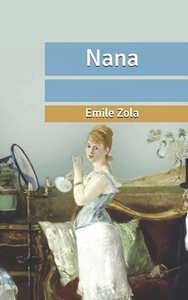You need to sign in or sign up before continuing.
Take a photo of a barcode or cover
challenging
informative
reflective
sad
slow-paced
Plot or Character Driven:
Character
Strong character development:
Yes
Loveable characters:
Complicated
Diverse cast of characters:
No
L'écriture de Zola et ses personnages sont toujours aussi incroyables. Nana restera je pense un de mes tomes préférés des Rougon-Macquarts. Les descriptions de Nana faisant s'écrouler tout le monde autour d'elle sont fascinantes. C'est un personnage très ambivalent mais si bien construit. Je l'ai adorée.
Moderate: Domestic abuse, Miscarriage, Physical abuse, Suicide, Toxic relationship
C'est un beau livre, dans le style de Zola mais je l'ai trouvé trop cruel.
funny
lighthearted
slow-paced
Plot or Character Driven:
Character
Strong character development:
No
Loveable characters:
No
Diverse cast of characters:
No
Flaws of characters a main focus:
Yes
Nana has a stage-like quality to it. Almost every chapter at one point leads to a room full of people, quickly waving the perspective focus from one character to the next.
A success on the aesthetical level. But the jumbling of so many homogenous male admirers, which are all introduced at a rapid pace in the beginning, convolutes the entire novel.
Moreover, the major chunk of the novel – between the iconic opening and ending – can best be described as much ado about nothing, for better or (too often) for worse.
This approach effectively portrays the exhausting and chaotic tug-of-war between the men who all want Nana for themselves. However, this rather generic squabbling between the men and Nana doesn't do enough to distinguish itself from other stories in which a femme fetale juggles a bunch of rich men.
Some of the men receive a modest amount of compassion. At different points in their individual downfalls they are painted as tragic figures in their own right – if only with a few small brush strokes. This compassion for the rich may be surprising for a very class-conscious and often class-critical author like Zola, but it definitely fits the bigger picture in its nuanced execution.
Nana herself, as a potentially unforgettable protagonist, mostly shines in the opening and end chapters, with too little spice in most other chapters. She is best when her reckless abandon is most blatantly displayed, which is only too seldom the case.
A success on the aesthetical level. But the jumbling of so many homogenous male admirers, which are all introduced at a rapid pace in the beginning, convolutes the entire novel.
Moreover, the major chunk of the novel – between the iconic opening and ending – can best be described as much ado about nothing, for better or (too often) for worse.
This approach effectively portrays the exhausting and chaotic tug-of-war between the men who all want Nana for themselves. However, this rather generic squabbling between the men and Nana doesn't do enough to distinguish itself from other stories in which a femme fetale juggles a bunch of rich men.
Some of the men receive a modest amount of compassion. At different points in their individual downfalls they are painted as tragic figures in their own right – if only with a few small brush strokes. This compassion for the rich may be surprising for a very class-conscious and often class-critical author like Zola, but it definitely fits the bigger picture in its nuanced execution.
Nana herself, as a potentially unforgettable protagonist, mostly shines in the opening and end chapters, with too little spice in most other chapters. She is best when her reckless abandon is most blatantly displayed, which is only too seldom the case.
Zola is an author who can entrance you one moment and then slip in a line about the death of a major character which zings the support out from under you the next. He is descriptive and brutally honest about the ugliness of reality. He has no sympathy for his characters, sparing them nothing. He is equally willing to bless and to murder. And he is magnetic in his ability to storytell. All of his stories have some sort of political, social, philosophical, or historical statement to make through either outright declaration or the use of symbolism but you don’t even mind reading through pages of horrific characters (not due to the writing but to the character of the characters) because the story is so wonderfully told. And he has the magical talent of combining just enough light to the dark side of life so that you don’t feel sinful reading about it.
funny
reflective
slow-paced
Plot or Character Driven:
Character
Loveable characters:
No
Diverse cast of characters:
No
adventurous
reflective
sad
tense
slow-paced
Plot or Character Driven:
Character
Strong character development:
No
Loveable characters:
No
Diverse cast of characters:
No
Flaws of characters a main focus:
Yes
challenging
dark
slow-paced
Plot or Character Driven:
Character
Strong character development:
No
Loveable characters:
N/A
Diverse cast of characters:
No
Flaws of characters a main focus:
Yes
reflective
slow-paced
Plot or Character Driven:
Character
Strong character development:
Complicated
Loveable characters:
Complicated
Diverse cast of characters:
No
Flaws of characters a main focus:
Yes
Zola's biggest accomplishment with Nana is that -even with copious details of theatre, racing, and opulence- it leaves a book which the readers colour themselves. There's no other explanation for how some describe Nana as some insidious force that destroys those around her, and others battle with who is at fault for the tragedies within its pages.
The fact that Zola spends the first third carefully detailing what and who suffocate Nana -- the men who insist on being seen and loved by her, those who question her, and who laugh at her, let alone the demands of Parisian society -- before laying her own dangerous impulses bare, complicates any reading where Nana is The problem. She is a young woman trying to rise above her station, earn a place for herself in society, and balance the demands of men who want to shackle her to roles that suit their own self interests. Refused even the barest freedom of a night alone, Nana's world quickly descends into careless destruction.
My vintage copy has but one marginal note -- one that describes her as a "disease." That Nana is painted as the disease, the destructor, and is made responsible for the actions of man, might just make the last century+ of readers another layer of suitors demanding her bend to our will.
The fact that Zola spends the first third carefully detailing what and who suffocate Nana -- the men who insist on being seen and loved by her, those who question her, and who laugh at her, let alone the demands of Parisian society -- before laying her own dangerous impulses bare, complicates any reading where Nana is The problem. She is a young woman trying to rise above her station, earn a place for herself in society, and balance the demands of men who want to shackle her to roles that suit their own self interests. Refused even the barest freedom of a night alone, Nana's world quickly descends into careless destruction.
My vintage copy has but one marginal note -- one that describes her as a "disease." That Nana is painted as the disease, the destructor, and is made responsible for the actions of man, might just make the last century+ of readers another layer of suitors demanding her bend to our will.
emotional
reflective
medium-paced
Plot or Character Driven:
Character
Strong character development:
No
Loveable characters:
Complicated
Diverse cast of characters:
No
Flaws of characters a main focus:
Yes






